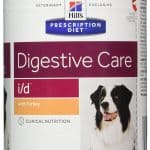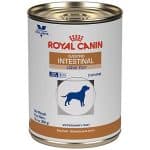- How to Figure Out Your Dog’s Age - January 8, 2022
- Prescription Diet Dog Food Guide and Recommendations - December 12, 2019
- How To Take Care of Your Bichon Frise (Grooming Tips) - December 12, 2019
Just like specialized diets prescribed by your doctor (such as low carbs or no sugar foods) dogs with a chronic disease or terminal illness must also follow certain specific diets prescribed by their vets. Prescription diet dog food is used to be most readily available in vet’s offices, but now you can find a wider selection online and even from some small-batch dog food companies, like Just Food for Dogs.
Prescription dog foods vary in ingredients and are prescribed by vets depending on your pet’s medical needs. Unlike regular dog food, prescription food cannot be bought at the stores without a doctor’s prescription. Specialized medical dog food contains higher/lower proteins and many other components geared towards helping elderly dogs or dogs with medical issues that prevent them from having a healthy lifestyle.
What Is Prescription Dog Food?
Prescription dog food is dog food made with a special formulary that, because of its custom ingredients, does not meet the AAFCO (Association of American Feed Control) guidelines for commercial dog food. This is why when you go to the pet store, you are not allowed to purchase prescription dog food without written proof of your vet’s directive. The food is kept behind the register or at the store’s Veterinary counter. At Petsmart, for example, the prescribed food is sold behind the vet’s counter. And while other stores have prescription foods on their shelves, once you get to the register you must present the written prescription from your’ dog’s vet or you will not be allowed to buy it.
Unfortunately, the internet has made it possible for irresponsible dog owners to buy prescribed food without consulting their dog’s veterinarian. Merchants like Petco or Petsmart require proof of the prescription prior to approving the order. Stores like Amazon sell prescribed diet food and assume no responsibility because it’s the dog owner’s duty to consult the experience of a vet. However, other stores like Chewy.com will request a vet’s prescription before they release the order.
Can My Other Dogs Eat the Prescription Food Too?
No.
Remember when we mentioned that prescription diets don’t meet AAFCO guidelines? That’s an important detail. Any bag or can of dog food that you purchase in the U.S. has to meet AAFCO guidelines to ensure that it is safe to feed a dog. If you allow an otherwise healthy dog to eat prescription dog food regularly, they will become seriously malnourished and eventually very ill.
Don’t give in to the droopy, sad eyes, face or whining. Giving your pooch prescribed food when he/she doesn’t need it will make him/her sick. Therefore, be diligent if you have more than one dog. Make sure to supervise your dogs or separate them when feeding time comes along so your healthy pooches don’t eat food that can kill them. Allowing your healthy dogs to digest prescribed food could also be detrimental to their health if it doesn’t kill them. This is the reason why prescription food is mostly accessible at veterinary hospitals.
What Illnesses Require Prescription Diet Dog Food?
Prescription dog food can be used as either a standalone treatment or in support of a series of treatments for a wide range of medical problems.
Digestive Disorders or Gastrointestinal Issues
Just like humans, some dog’s have sensitive digestive systems and are prone to infections or mild to severe stomach issues. According to PetMD, “Pancreatitis develops when the organ becomes inflamed, which can occur for a number of reasons (obesity, infection, trauma, metabolic disorders, etc.) or seemingly out of nowhere.” When the pancreas gets inflamed, something causes the enzymes inside the pancreas that digest the food to break down outside the stomach resulting in the absorption of other organs in the body including the liver and kidneys.
If not taken care of right away, the progression is immediate and deadly. Symptoms vary in dogs, but if your pooch has been vomiting, has lost weight, has had diarrhea, has been fatigued and or has had difficulty breathing amongst other things, your vet will do a blood work and stool test to determine the cause. When caught early, pancreatitis can be taken care and your pooch cured. This is when vets prescribe a special medicated diet food. Other digestive system disorders include gastroenteritis, acid reflux, inflammatory bowel disease (IBD), etc.
Kidney Disease/Failure
Renal disease or failure in dogs often demands a low-protein diet provided by the best low-protein dog food. Commercial dog foods, even those with the lowest protein content, still contain more protein than a dog with failing kidneys can handle.
Since an otherwise healthy dog will become severely malnourished if fed a low-protein food for too long, “low-po” dog food is only available by prescription. There are also specialty hepatic formularies that restrict not just protein, but also copper, fat, and phosphorus, which can also be dangerous for already burdened kidneys.
Weight Loss
Depending on the pounds your pooch has gained, your vet will prescribe a special diet for your little one. If it’s a matter of one or two pounds, most likely your vet will tell you to cut down the portion of food you are feeding your dog. However, usually, more than a two-pound increase will alert your vet because having a fat dog is not cute or cuddly, but dangerous instead.
Fiber based diets assist with the carbohydrates absorbed which help moderate glucose consumption in dogs. If you notice your best friend a bit plump, check to see if you cannot feel his/her ribs. If you feel around his/her side and can’t determine where the ribs are or the waist is, your dog is most likely overweight. In addition, you’ll notice him/her having difficulty walking and is slow, and sleeps more than his/her normal routine. Maintaining your dog’s weight is imperative because dogs get sick like humans and can develop arthritis, diabetes and heart disease. If that happens you can switch them to the best diabetic dog food to help remedy and reverse the problem.
Hill’s Prescription Diet w/d Canine Digestive/Weight/Glucose Management – Chicken – 12x13oz
Urinary Tract Infections and Bladder Stones
Sadly dogs also get urinary tract infections and bladder stones just like humans. Female canines are more prone to it than the males. When urinary tract infection invades your dog, certain prescribed foods have reduced levels of magnesium and certain types of bacteria that fight the bad germs and regulate the nutritional management of calcium oxalate and other chemicals needed to maintain your dog healthy.
Hill’s Prescription Diet u/d Canine Non-Struvite Urinary Tract Health – 8.5lb
Urinary tract and bladder health
Cancer
Dogs with cancer or cancerous tumors can be switched to a neoplastic dog food. Research has suggested that cancer cells are fed by carbohydrates, and commercial dog foods are usually very high in carbs (even the best ones). A neoplasia support prescription dog food is generally very high in Omega 3 fatty acids and very simple, restricted carbohydrates. They are also generally formulated with fewer antioxidants than can be found in the top-of-the-line low-carb commercial options, since these can (and will) interfere with chemotherapy treatments.
Allergies
Sometimes dogs develop sudden allergies to food or other ingredients. A sensitive digestive system means your dog will not eat. Other times, your pooch will throw up or get diarrhea after he/she eats. When this happens, a medical diet will be prescribed by your dog’s vet. My Harley for example, developed allergies to poultry when she was seven years old. It took a year or so to narrow down the ingredients she was allergic to and to find the foods she could eat without throwing up. For a while, she ate prescribed venison, but a few years later, her stomach did not like it either. Today she is on the Hills Digestive Care i/d and sliced apples which she loves. Dinner or lunch time is no longer stressful and instead, at 13.5 years old she continues to be her spunky self.
Which Brands Sell Prescription Dog Food?
Hill’s Prescription Diet (or Hill’s Science Diet) and Royal Canin are currently the only two mainstream dog food brands with a prescription line. If you’re buying food directly from your vet’s office, it will almost certainly be one of these two brands. You can also find these foods on Chewy.com, though you will need to provide a copy of your Rx before completing your purchase.
If convenience is less important to you than the quality of the food, you should consider going independent. Darwin’s Natural Pet Products and Just Food For Dogs both carry prescription dog food made with their proprietary, human-grade, whole food blends. Like Hill’s and Royal Canin, they will also require a prescription before they can be dispensed. Darwin’s Natural food can be purchased either online or in person from their Tukwila, WA store; JFFD food can be purchased online or in person from one of their kitchens in Southern California.
How Do I Get Prescription Diet Dog Food?
Medical diets are prescribed when your veterinarian decides your little furry one has no other option. Most vets will advise dog parents prior to going that route. Sometimes a change of regular store bought food, brand or organic kibbles is all your dog needs. After all, if we ate chicken salad 365 days a year, we’d be pretty sick of the food as well.
If you feel that your dog is suffering from an illness that can be treated with a special diet, your first step is to make an appointment with your vet. If your vet confirms the diagnosis and agrees that such treatment is the best course of action, they will write you a prescription for the special dog food. Like a prescription for human medication, this script can be taken anywhere the specialized food is dispensed.
Of course, dogs will be dogs, and they do tend to get tired of the same food. If they refuse to eat their prescription food, you may want to switch them to another type or flavor. This does not mean you should not consult with your doctor first, and do not take them off the prescription food unless your vet gives the green light. Remember, it’s better to be safe than sorry when it comes to the care of your loved one.
Continue reading:
Top 5 Rated Best Non-Prescription Diabetic Dog Food
Hill’s Prescription Diet Digestive Care with Turkey Dog Food Review










